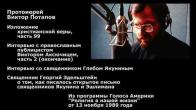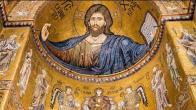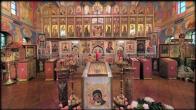ABOUT ORTHODOXY
You are here
The Parable of the Sower
The parable of the Sower and the other parables, set forth in the 13th chapter of the Gospel according to Matthew and in the parallel places in the Gospels according to Mark and Luke, were spoken by Christ during such a large concourse of people that because of the excessive crush of people the Saviour was forced to preach from a boat to the people standing on the shore of the Sea of Galilee. The Parable of the Sower, chronologically the first of Christ's parables, is a prophecy about the acceptance of the good tidings of the Gospel by mankind. In it is narrated how men accept the Word of God in different ways, and how this word acts differently on men, depending on the state of their soul. The Evangelist Matthew sets forth this parable thus:
Behold, a sower went forth to sow; and when he sowed, some seeds fell by the way side, and the fowls came and devoured them up: some fell upon stony places, where they had not much earth: and forthwith they sprung up, because they had no deepness of earth: and when the sun was up, they were scorched; and because they had no root, they withered away. And some fell among thorns; and the thorns sprung up, and choked them: but other fell into good ground, and brought forth fruit, some an hundredfold, some sixtyfold, some thirtyfold. Who hath ears to hear, let him hear (Matthew 13:1-9).
The Parable of the Sower is not difficult to understand, for the Lord Himself interprets it. In this parable the Sower is Jesus Christ; the seed is the word of God, while the earth, the ground is the human heart; the good heart is the fruitful earth, while the evil heart choked by sins is the earth that is good for nothing. From the Scripture we learn that faith cometh by hearing, and hearing by the word of God (Romans 10:17). That is why Christ sowed the word of God everywhere in the villages and towns, and in the deserts, and on the sea. He chose his apostles so that they too would sow the word of God. The Apostles appointed for themselves successors the bishops and presbyters, who continued and continue unto this day the missionary labor of spreading, sowing the word of God. The Church continues the work of Christ on earth it sows in our hearts the word of God.
When the living word of God is sown in the sinful nature of fallen man, a new life springs up. The ability to receive the word of God is given to all men without exception, and the chance to receive this new life from hearing the word of God is given to everyone to the same extent. The fundamental concern of the whole of Christian life consists in constantly working on one's own heart to prepare the ground in oneself for receiving the seed (the word) of God. Men approach this task in different ways. While we explain the meaning of the Parable of the Sower, let each of us, in accordance with the words of Bishop Theophanes the Recluse "...judge for himself as to which category he belongs."
Some people are inattentive, scattered and do not have reverence before the word of God. The heart of such people is like a beaten path, where no good fruit is able to grow, because the seeds of the Divine word are strewn onto the ground of a soul that is morally coarse, trodden down by passions, thoughts, vices. The soul of these people is like a road open to all impressions and thoughts; it is as if they are en route, always thirsting for new allurements and amusements... Every good thought in such people is constantly trampled upon by a tide of new impressions. During the reading or hearing of the word of God, the enemy of our salvation secretly comes to such people, and, as the holy, righteous John of Kronstadt says "like a thief in the house of a careless homeowner, he carries away the word of God from their heart, so that they would not believe and be saved." With such people the word of God quickly vanishes from their memory; it is forgotten, as if it had not been heard at all.
The seed which fell on the stony ground indicates those people who, perhaps, hear the word of God readily, with attention. It may be that this group of people is even sensitive to everything good, but they receive the word of God in the superficiality of their mind and do not allow it to penetrate to the depth of the heart. They have no root in themselves, like the seed along the way side, exposed to all who pass by. The trouble with such people is that they are lightminded, impatient, inconstant. They are ready to receive the word of God, as long as it does not require sacrifices from them. Under favorable circumstances, they believe; but under unfavorable circumstances, they betray their faith. They do not want to change their way of life in order to be worthy of the Kingdom of Heaven, they do not want to carry on the spiritual struggle "the unseen warfare" according to the expression of the Church Fathers, they do not want to go along the narrow path. When some affliction occurs, they are not prepared to be patient; they throw off the cross, and then they fall into despair, impatience and murmuring, and the seed of God, sown in the ground of their superficial heart, perishes. But after all, Christ says that only he that endureth to the end shall be saved (Matthew 10:22).]
The seed which fell among the thorns this is those people for whom the cares of this age and the deceitfulness of riches choke the word of God. It should be emphasized that the age itself is not to blame, but namely the cares of this age. Such people will hear the word of God, will understand it, and, it would seem, will take it to heart, and begin to live according to it. But quickly life's cares attack them or life's momentary pleasures of every sort beguile them, while the word of God, which had barely obtained a cramped place for itself in their heart, is oppressed by these manifestations, and, alas, there is no fruit unto eternal life, because these people gather fruits unto temporal life. Unfortunately, there are more of these people than any others. The word of God speaks of heavenly blessedness, but these people prefer earthly blessedness. Moreover, they often reason thus: "We shall receive the good things of heaven someday. But the world is giving its good things to us now." Some even understand the necessity for repentance, but they put it off. "We shall repent, we shall prepare for old age," they think, "but now let us make use of the enjoyments already prepared," forgetting, perhaps, that in old age they will have neither the strength nor the opportunity…
Finally, the seed that fell on good ground is those people who, having heard the word of God, receive it; and they keep it, having firmly resolved to follow it, and they offer the fruit of good deeds. Having received the fullness of the knowledge of Divine truth through hearing and reading the word of God, and having come to know this truth, they listen to its voice and they serve it. These people invariably follow the testament of the Apostle Paul: For not the hearers of the law…. but the doers of the law shall be justified (Romans 2:13).
In the Mystery of the Eucharist, the priest, elevating the bread and wine, says to God: "Thine own of Thine we offer unto Thee!", that is, "That which is Thine, we offer unto Thee!" So also the Parable of the Sower touches "the mysteries of the Kingdom of God." In order to understand this mystery, there must be on the part of those listening a direction of the will corresponding to it and a disposition of the heart fitting for its acceptance.
The word of God, that is, the seed, which is spoken of in the parable, is not at all something external for us, alien to us. Just as the Divine Word (the Logos)Christ is not Something alien to the Father, but rather His Onlybegotten, Who with Him constitutes "One" (John 10:30) and Who coexists with Him "from the beginning" (John 8:25); and just as the Son lives by the Father (John 6:57) and no one can come unto the Father except through the Son (John 14:6), and he who has seen the Son sees the Father as well (John 14:9), for the Son has told us everything that He heard from the Father (John 15:15) … likewise, the word of God, the word of the Gospel, sowed by Christ in our hearts at birth, is not something alien and foreign to us. The Gospel is not some kind of book which is read or studied outwardly. The Gospel is life in God, to which we are introduced already from our very conception by the power of the Holy Spirit, the power which makes us conformable to God, Godlike. It is not some kind information about some kind of strange events alien to us which were recorded by the Apostles that the human soul will learn in the Gospel; but in the word of God the human soul will get to know itself, its kinship and its involvement with God. In the Gospel the human soul will recognize the voice of its Creator, of its Heavenly Father, which resounds in the heart. In the language of philosophy this means that the word of God is immanent in us; that is, it is in us, with us, and not outside of us and not at all alien to us (although it does exceed our understanding). It is higher than our understanding. The seed of the Kingdom of God is sown, springs up and grows in a way that is mysterious and not understood by us. The Scripture says that a man sleeps and gets up night and day and does not know how the Kingdom of God springs up in him (Mark 4:27). It springs up in him in an unnoticed, miraculous manner. The fruits of the Kingdom of God sown in us likewise spring up in us miraculously and incomprehensibly, as the seed of the parable, and we cannot determine if the seed's increase is thirty-fold or sixty-fold or a hundredfold. We only know that when our heart begins to burn within us, as with the disciples at Emmaus, then it seems to us that the Lord Himself is opening our mind to the understanding of the Scriptures (Luke 24:32) and is introducing us to the mysteries of His Kingdom. When, in place of the desire to learn something from the Gospel about God, our heart begins to learn about Him within itself this is testimony that the seed "has brought forth fruit."
It is not for us to judge the quantity or the quality of the fruits borne from the seed of the Kingdom of God sown in us; we only know that the utmost for us would be to return all the fruits to Him from Whom they were received. Thus, showing us an example, the Son of Man, summing up His earthly life, said on the Cross: "Father, into thy hands I commend my spirit!" So also, at the Liturgy, when praying for the sending down of the divine grace, we cry out: "Thy own of Thine own we offer unto Thee!" Thus, regarding the fruits of the seed of the Kingdom of Heaven, God says to man: "My son, give me thine heart!" (Proverbs 23:26). This means all that thou hast, O man, thy gifts and talants, thy deeds and thoughts and feelings, all that thou lovest and believest in, that is, thy whole life, thy whole heart, give this back to Him Who gave it thee.
But we must give back to God pure thoughts and feelings, pure love and faith, a pure life and an immaculate heart. Following the Psalmist, we must be prepared to say: "Ready is my heart, O God, ready is my heart" (Psalm 56:10). But how do we prepare the heart, so that it would be ready to receive the seed, the word of God?
The Parable of the Sower concludes with the words He who hath ears to hear, let him hear! It is as if Christ, using these words, is knocking at the heart of each man, calling us to look attentively into our soul, to understand ourself, to determine to which category of people set forth above we belong.
In the Parable of the Sower, Christ sets before everyone the same goal: to receive the word of God with all one's being, to receive it into a pure and good heart. It is impossible to express the attribute of a pure heart with more powerful words than with the words of the Apostle Paul, who said of himself: …I live, yet not I, but Christ liveth in me.
In order that the word of God might put forth deep roots in our soul, it is necessary to prepare the ground of our heart in a proper manner, just as the wise farmer does, by clearing the earth of thorns and other weeds that hinder the growth of the beneficial fruit. In spiritual life, this means making a turnabout in ourselves through repentance. Only when a man will give freedom to the word of God to act within himself will evil be uprooted from his heart, and the word of God "through a Divine change," according to the expression of the holy hierarch Gregory the Theologian, regenerates the very nature of man.
The Parable of the Sower shows that God does not save a man without the participation of the man himself. The LordSower puts into the heart of a man His lifecreating word; the man must open his heart, accept the word into it and bring forth fruit.
In the Lord's Prayer, "Our Father", we repeat the words "Thy Kingdom come, Thy will be done, on earth as it is in heaven," and Christ answers this expectation: The kingdom of God is within you. But this kingdom desired by us, according to Christ's word, is attained only by exertion. This means that the Lord awaits activity from man active service of God and neighbor, active pursuit of personal perfection.
©V. Potapov
Relics in cathedral - monthly calendar
| S | M | T | W | T | F | S |
|---|---|---|---|---|---|---|
|
1
|
2
|
3
|
4
|
5
|
6
|
7
|
|
8
|
9
|
10
|
11
|
12
|
13
|
14
|
|
15
|
16
|
17
|
18
|
19
|
20
|
21
|
|
22
|
23
|
24
|
25
|
26
|
27
|
28
|
|
29
|
30
|
31
|
|
|
|
|
PARISH LIFE
Address of our Cathedral
While all the materials on this site are copyrighted, you may use them freely as long as you treat them
with respect and provide attribution on the Russian Orthodox Cathedral of St.John the Baptist of Washington DC.









